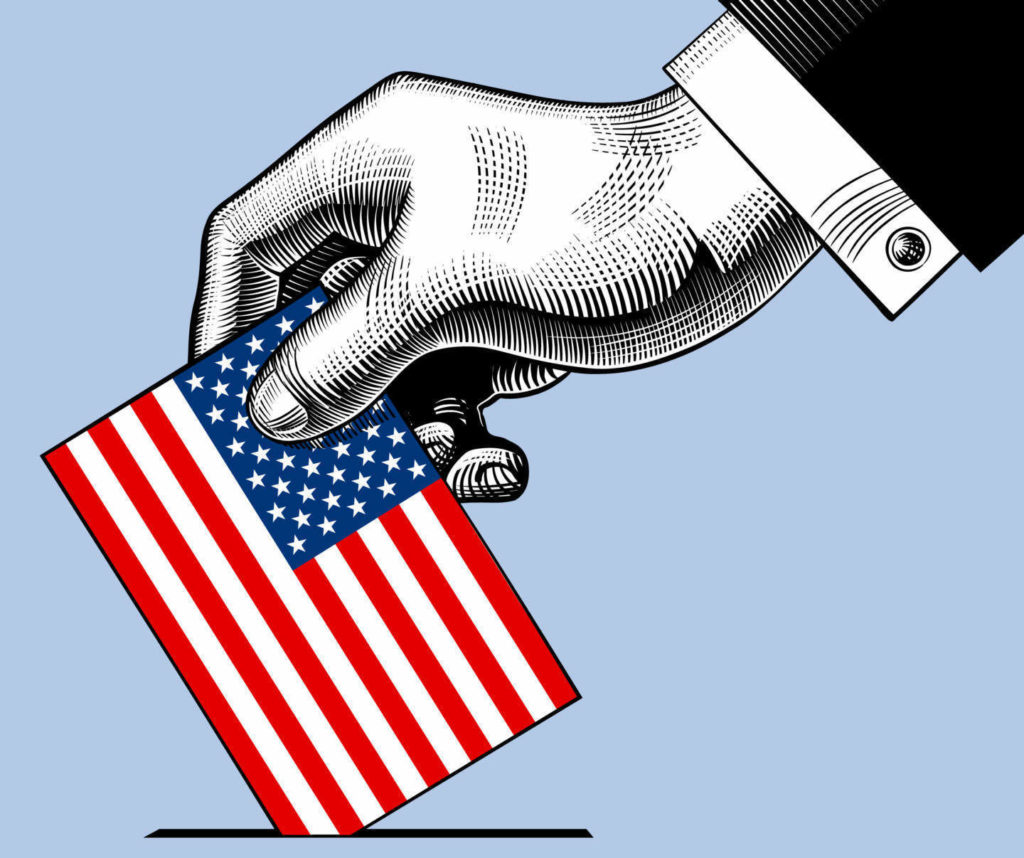On the Act of Voting
A discussion of what #NeverTrump means, on Sanders v. Trump, and some about the philosophy of voting.

There is a debate that has emerged several times in the comment sections here at OTB that boils down to a question of what casting a specific accomplishes in a given election (ins terms both of who it helps get elected, but what the vote itself means). The most recent iteration was is James Joyner’s post, Sanders as the Democrats’ Trump.
The main context for this debate really has been the Trump presidency. So, that specific scenario becomes the focus of this post (although there are some more abstract ruminations as well). In other words, the general context of this discussion is whether one should cast one’s vote for a third party candidate (or abstain from voting) in the context of US elections (especially for president) given the way in which our system essentially creates a binary choice.
While I do want to start with 2016/2020, let me provide a spoiler for the broader conversation: I am not making the argument that every vote a third party is a wasted vote. However, I think that context shapes these issues and that there is not some pure vote-casting function that remains constant across elections (or electoral systems).
To focus on the Trump issue, the conversation boils down to a version of what should “#NeverTrump” mean. As my co-blogger Doug Mataconis has pointed out in the past, to him that meant simply that he would never vote for Trump, but that it does not mean voting for his Democratic opponent.*
I do understand the position but have long thought that if one is really, truly opposed to Trump because he is a uniquely bad candidate/president, then the truly efficacious NeverTrump position would be one that included voting for the only candidate with a chance of defeating Trump (i.e., the Democrat).
My logic is pretty straightforward: any voter (especially a Republican/Republican-leaning one) who finds Trump so problematic that they cannot vote for him should be willing to do whatever is necessary to keep him out of power. In other words, once I have declared myself NeverTrump am I not saying I do not want Trump to be president? In the US system saying that you do not want Trump as president is to say that your favor the Democrat as president (because that is the only other possible outcome, save in the most improbable of elections).
But wait, you say: just because I don’t want Trump, doesn’t mean I affirmatively want the Democrat!
To which I cannot help but ask, “what does never mean?”
I get it: many NeverTrumpers are just saying that they will never vote for Trump. Ok, fine, but if he is so bad that one cannot vote for him, what is the point of then not doing everything in one’s limited power to ensure that he is never president? By not voting for Trump you are not affirmatively helping him into office, but how is voting third party or abstaining an efficacious use of the vote? What does never really mean?**
I will readily admit that I am with Tom Nichols: I can vote for any Democrat who is mentally stable and not compromised by an enemy power. This, to me, is the real definition of NeverTrump. Never means he will never get my vote and, moreover, that I think he should never have been in the White House to begin with and, therefore, should never be re-elected.
(After all, a lot of people didn’t want Romney in 2012, but there was no NeverMitt movement). **
I think this because I would argue (indeed, have been for some time now) that Trump is a threat to the stable global order (not that he will start wars, but that he is damaging the foundations of the post-WWII liberal order in a way that could have some serious long-term consequences) and that he is a genuine threat to the fabric of our constitutional order. Further, he is corrupt and incompetent. And, to make all of that worse, he surrounds himself with the corrupt and/or incompetent. He, quite simply, does not understand his job and he clearly puts his personal interests before those of the country. These are reasons to never have wanted him to have power in the first place and to never want to see a second term.
This brings us to the unfolding 2020 election, which is shaping to potentially be Sanders v. Trump (although it may yet be another Democrat). Sanders as the nominee causes a lot of people heartburn (if anything, a lot of people are worried he will lose to Trump, and if one is the kind of NeverTrumper defined above, that is a serious concern). I will admit that I am by no means thrilled by a Sanders’ candidacy (and, to be honest, I am not thrilled by any of the candidates, but Sanders is well down my personal preference list).
So this gets to the debate from about the purpose of voting and whether someone who is seriously opposed to Trump should vote Democratic, regardless of the candidate.
One position is that voting is an affirmation of a candidate, and if one cannot affirmatively support Sanders, one should not vote (or one should vote third party). However, to me, voting is an application of power, however small, and power should be deployed that helps generate an outcome. Voting third party or abstaining in the current context is, I would argue, dissipating power, not utilizing it.
I suppose what ultimately gets to me about the whole position is as follows. The person who is opposed to Trump, but who votes third party (or abstains) clearly is hoping that the Democrat will win, they just don’t want to taint themselves by voting for a candidate they don’t especially prefer (even if they prefer then to Trump). Given that we all know that the third party candidate is not going to win, is not the most efficacious choice to vote for the Democrat?
To me there is a weird abdication of responsibility that goes with the logic that says “Trump is singularly awful, but I cannot vote for the Democrat, even if I hope that the Democrat beats Trump.”
(Of course, if one really thinks the D to be equally bad to Trump, then this discussion does not apply).
Additionally, as I have also argued before (and very much still believe), the number of votes cast against Trump matter as a signaling device. If anything, the more voters who vote Democratic because of Trump are votes the Republican Party needs to understand that they are losing.
I live in Alabama. Alabama will be red (deep red) on election night. One could argue my anti-Trump vote will not matter (and, as far as the Electoral College is concerned, it won’t). But we will add up the national popular vote for discussions’ sake. If Trump wins the EC again but loses the popular vote, the bigger the margin, the more some will see the flaw in the system. If he loses overall, the bigger the loss, the bigger the signal sent to the GOP (and to history).
I think all of that matters (but understand that one’s mileage may vary).
After all, what is a vote?
A vote is the sliver of popular sovereignty that a citizen has in a representative democracy. And, of course, how that vote is applied and counted varies depending on the electoral rules (the Electoral College v. a direct popular vote, for example).
It is worth remembering, too, that voting is a collective action problem. What I do, individually, with my vote really has practically no significance. Elections rarely come down to one singular vote (although it does happen in some local elections). So if I abstain or vote third party or write-in Vermin Supreme, it doesn’t matter.
However, if enough people who think this way act as described, it can definitely matter. Hence, the collective action problem.
Consider: if I am an abstainer and everyone else does the same thing, that would be a massive collective problem that my individual act does not create.
The difference in Florida in 2000 was 537 votes. The difference in the EC in 2016 boiled down to ~77,000 votes across three states. As such, it doesn’t take a lot of people, out of ~120 million voters to change outcomes. So, if enough people who can’t stand Trump and think him a serious threat choose to vote third party or abstain, then they will have four more years of Trump because the collective result of their individual choices will sum to his victory. This appears to me as those voters getting what appears to be their worst possible outcome.
This is because, quite simply, the act of voting does not exist in a vacuum. It is heavily influenced by the electoral system wherein that vote is embedded. Our Electoral College, especially with the unit rule (i.e., that the plurality winner gets all the electoral voters from a given state) means that not only are third party votes wasted, but votes for the second-place candidate are also wasted (they aren’t used in determining who wins the presidency). The contest is about getting the plurality to win the EVs. If one is NeverTrump in whatever iteration of that concept, the only efficacious vote is for the Democrat.
Basically, there is a difference, I would argue, between voting solely as a matter of pure preference and voting as part of a broader system and process and, therefore, the way in which a given vote sums (and that verb is important) up with all the others.
Am I saying that one should never vote third party in our system? No. I think there are times that sending signals of discontent for both parties is appropriate. I also understand that sustained third party voting can start to put pressure on the prevailing parties (but, I continue to also think that given the US primary system that such efforts are likely fruitless).***
This post has become longer (and taken longer to write) than I initially intended, so I will stop here, recognizing that some issues need further elaboration (and hopefully the comments will help tease those out).
*I feel like Doug wrote a post on this, but I may be thinking of something he posted on Facebook, as I cannot find the specific post–but I will admit to only looking for a few minutes. Regardless, one can get a sense of his position from the comment thread on a James Joyner post from June of 2019: Should NeverTrumpers Become Democrats? The comment thread also has a version of the vote debate that inspired this post.
And before anyone asks: I have no new update on Doug (the latest remains, to my knowledge, that Jazz Shaw spoke to him about a week ago).
**Indeed, for the most part, when people don’t want the R, they tend to vote D and don’t talk about NeverX. The “never” issue is really relevant to Rs only–in fact for a self-professed small-l libertarian like Doug to proclaim he is NeverTrump is not that big of declaration unless he is willing to go all the way to voting D, which he is not.
***A simple example: in the UK a party like UKIP put pressure on Conservatives by running candidates and siphoning votes. In the US it is much more effective for a UKIP-like movement to simply run in the primaries as a way of directly influencing the party, and maybe even getting into office. See, e.g., the Tea Party.






A long time ago, when I was in college, one of the elective courses I took was “Introduction to the Art of the Theater”. One of the specific plays we studied during that course was Bertol Brecht’s “Fear and Misery of the Third Reich”. For those not familiar, it has no central story arc, but rather a series of unrelated scenes depicting different aspects of life under Hitler’s rule.
One scene in particular (“The Peat-bog Soldiers”) involves a group of political prisoners (a socialist, a communist, a Jehovah’s Witness, etc.) on a concentration camp labor detail. The spend most of the scene arguing with each other over who’s fault it is that Hitler came to power, stopping every so often as the guard comes by and orders them back to work (during which they sing a work song wit the refrain “We are the peat-bog soldiers / With shovels on our shoulders / We march”)
The irony of the scene being that even in the concentration camp, they’re more worried about fighting among themselves and they only think they’re capable of working together for is to do the work that Hitler wants them to do as part of the labor detail.
So this is the big question this year for everyone from #BernieOrBust to #NeverTrump: most of us are probably not going to get the candidate we most want. But when the vote comes in November, are you going to vote Democrat to maximize the chance of getting Trump out, or are you going to join the Peat-bog Soldiers?
@Stormy Dragon nothing but appreciation for anyone who pulls a Brecht reference out on a leap day Saturday afternoon!
Our system permits third party votes and not voting, but the winner is always going to be one of the top two.
If the lesser of two evils is dramatically lesser, and the race is close, you have to embrace the lesser evil — if you don’t, the delta between evils is on you (divided, of course, among all those who failed to support less evil).
That sounds utilitarian, and it is, but even the noble, pristine vote of one’s conscience for the unicorn candidate of your dreams is utilitarian — a belief that the vote against the system will ultimately have more effect than voting for the lesser evil.
Now, if you live in NY or Texas or something, where the result isn’t in doubt, vote for your unicorn. I might even think that’s an obligation.
I know everybody thinks Texas is irredeemably Republican but in early voting ended yesterday, the percentage of Democratic early voters blew the doors off all previous years in the 10 largest counties.
And that is on top of a 600,000 increase in registered voters from 2018. Republican participation is early voting was down but that was probably due to the lack of competition in the Republican ranks (except Fort Bend County, a suburb of Houston).
Time will tell if there is something happening.
Wow, a long, meaty post. Thanks.
I’d like to highlight this:
This really comes down to a balancing test. In other words, what sacrifices is one willing to make to vote in the most efficacious manner to remove Trump. For Democrats and their allies, this is an easy question – little to no sacrifice is required as they would vote for the D candidate anyway. Their views aren’t really relevant to this question.
For those who aren’t Democrats and are either wholly or partially opposed to the Democratic platform or the platform of the specific Democratic candidate, then this decision is much more difficult since opposing Trump will require actual sacrifice and carry negative consequences. So those negative consequences, real and potential, have to be compared with your level of opposition to Trump. There is a range of possibilities where an individual may draw that line and go the extra step from not voting for Trump to actively voting against their own political interests by voting for the Democratic opponent.
For example, someone who is pro-life but hates Trump would find it difficult to affirmatively vote for a candidate that supports no restrictions on abortion and full government funding for it.
I agree that voting is exercising power. And, as noted many times and in many ways in the other thread, the only way to generate a negative political outcome (ie. remove Trump from office) is to affirmatively vote for another candidate. There is no mechanism for negative voting.
But therein lies the problem I’ve repeatedly been trying to describe.
You have power in your vote but you can only choose to apply that power to affirmatively support a candidate or choose not to apply it at all by choosing not to vote. There is no option to apply that power against a candidate. The motivation to remove Trump does not change the fact that you have to vote for a candidate. The act itself of voting is affirmative (you are selecting to support a specific candidate) so voting maximally “against” Trump still requires voting for to the Democratic candidate.
If you don’t like the candidate you vote for but give them your vote anyway, you are in-fact, supporting that candidate and are partly responsible for the consequences of whatever kind of presidency he or she will bring. Voting for a candidate comes with many consequences, not just the ones we seek.
Likewise, If I vote for Trump I would be a de facto Trump supporter and would be partly responsible for the consequences of a second Trump term, should he win, regardless of my reasoning.
The whole point of this that voters should be accountable for the total consequences of their votes. If a voter chooses to vote for Sanders to beat Trump, then part of that deal is accepting the consequences of a Sanders administration, because that’s the responsibility that comes with voting for a candidate.
As noted before, there are degrees of opposition to Trump. The definition of #nevertrump that you and Tom Nichols share is on the extreme end of that wide range of viewpoints. Yours is not an unreasonable or invalid viewpoint, but it is just one viewpoint among many. I hope you both realize that not every #nevertrumper is going to accept your definition and its underlying assumptions.
In light of that, it seems to me that one disagreement we have is that you seem to focus only on the consequences related to Trump when it comes to your vote choice. It appears to be your only priority. (Please correct me if I’m wrong) You don’t seem interested and have not discussed the other half of that coin, which is an examination of the consequences of a Sanders Presidency, which you would enable and be partly responsible for by voting for him. Indeed, your #nevertrump definition removes the consequences of a Bernie vote entirely from your calculus.
And please note that I’m not criticizing your decision or reasoning. If any sane Democrat is an acceptable compromise from your viewpoint, and you’re willing to accept the consequences of and responsibility for enabling a Bernie Presidency, then great, vote for Bernie in good conscience.
What I try to do is consider the full consequences of my vote choice to include what kind of President an alternative candidate would be. That obviously means I don’t agree with your #nevertrump definition as I’m not willing to subsume everything in the service of opposing Trump.
And so I go back to the balancing test where risks and tradeoffs are compared. And when it comes to Bernie, the tradeoff isn’t worth it. Like Trump, I think Bernie is unfit for the office and has no business in the White House. So I’m not willing to go that extra step from not voting for Trump to the maximalist approach you and Nichols are taking when it comes to Bernie.
Yesterday NYT ran a column by Steve Phillips, Bernie Sanders Can Beat Trump. Here’s the Math.Mr. Stevens is a D activist and his case isn’t entirely compelling, but he’s got a point. Among other points he says,
This made me curious so I looked at WIKI’s summary of the 2016 vote by state for third party votes in the notorious trio of PA, MI, and WI.
In those three states Trump won by the famous total of 77,774 votes over Clinton, .6% of the total vote. The total third party and “other” vote was 707,536, 5.1%, 9 times the margin of victory. In those states Libertarian votes outnumbered Green 3:1. It seems reasonable that without the 538 effect, the assumption Clinton had it in the bag, many of the Green votes would go to Clinton, or the D in 2020. Presumably a lot of the Libertarians were marginal Rs who didn’t want to vote for Trump. I have no idea where they go now.
But the third party protest vote in these three states decided the 2016 election, one way or another. (In an election this close about ten things “decided” it, in the sense that had any of them gone the other way, say Comey followed policy and kept his mouth shut, it would have gone the other way.)
@mattbernius:
This is probably one of the very few blogs where a) someone would make a reference to Brecht, and where b) everyone would understand it.
@gVOR08:
Gary Johnson got over 4 million votes, an increase of 3 million from 2012. It’s not clear which side those defected from, but I’d guess most were #nevertrumpers who hated Clinton.
The other side of the Sanders coin is that some number of moderates who could vote for an establishment candidate like Clinton in 2016 will not be able to stomach voting for Sanders today. So Sanders will likely get back the left-wing Stein defectors but would lose more moderate voters give the massive difference between Sanders and Clinton.
@Andy:
I have nothing but the greatest empathy and respect for those who held their nose and voted for Roy Moore for Senate over Doug Jones, if abortion was their reason. I think they’re wrong, but… I completely understand them.
I have no respect for those who didn’t hold their nose though, and just voted for Roy Moore.
And those who voted third party because they couldn’t vote for a pro-choice candidate, but couldn’t vote for a guy who creeps around teenaged girls… I think they voted wrong, but a Senator is only one voice in a hundred, so maybe not. I don’t think anything related to abortion has come down to that one extra vote for reproductive freedom.
@Andy:
I think Bernie would have a bog-standard ineffective Democratic administration legislatively, tied up in the courts on executive actions, but with professionals in charge of things like pandemics.
I honestly and earnestly hope that nothing happens that makes us have to see the worst case scenario of Trump that makes Bernie so much preferable that you would have to vote for him,
@Andy: At the end of the day, Sanders is running as the Democratic Party’s nominee, not the Democratic Socialist Party’s nominee.
The people he is going to have to pick from for most of his appointments are going to be Joe and Jane Democrat. His cabinet appointments, for example, will end up being similar to Warren’s.
“Bernie being Bernie” can only take him so far. Unlike Trump, he will not be able to force a majority of Congressional Dems to bow to his wishes out of fear.
If you won’t vote for Bernie, you are actively opposing to a return to governmental and diplomatic norms and for the furthering of an autocratic Dominionist kleptocracy.
Fair warning: It’s nearing bedtime and I’ve had a sip or two of scotch.
I have several issues with your position as written. I’m hoping there are some caveats that you assume, but didn’t write.
All emphasis in quotes is mine
Election fraud? Voter intimidation? Lynch mobs hunting down and killing registered republicans? (Yes, I’m being overly dramatic–because you’re refusing to accept that #NeverTrump people might have self-imposed limits.
No.
I can say that I don’t want Trump and I don’t want whomever the democrats nominate. I can do that by voting for someone else (or choosing not to vote). Your way of thinking is why we’re locked into a 2-party system. There are half a dozen parties out there who could get significant seats in Congress if everyone wasn’t locked into the notion that there are only two options. It’s a self-fulfilling prophesy.
#NeverTrump can mean “I will never support Trump”. It doesn’t have to mean “I will do anything in my power to get Trump out of power”. The latter opens up far too many excuses for radicals and psychopaths.
Do we live in Fantasy Land or do we live in reality? Considering the overwhelming power that the Democrats and Republicans have over any other political party, of course,for now, we are locked into a 2-party system, that’s simply a fact, so depending on where you live, if you aren’t voting for the Democratic candidate, you are helping the Republican candidate to win the election…
@Mu Yixiao:
Not just overly dramatic, IMHO–but obviously going well beyond my obvious point.
That’s because for the November 2020 contest, barring a truly extraordinary turn of events, we are very much locked into a binary choice.
Do I want it to be that way? No.
But reality is reality.
No–it is a structural result of our institutions.
In the abstract, all well and good. In stark, cold, concrete reality: the next president will either be Trump or the Democratic nominee (barring, of course, an untimely death).
There is simply no way around that fact.
There are half a dozen parties out there who could get significant seats in Congress if everyone wasn’t locked into the notion that there are only two options. It’s a self-fulfilling prophesy.
Here are half a dozen existing United States Political Parties taken from this list of more than 30 political organizations that have fielded candidates in the past.
Please help us all to realize which of these parties “could get significant seats in Congress” this November to thwart Donald Trump and his toadies from turning the United States into a White Racist theocracy.
CONSTITUTION PARTY
GREEN PARTY OF THE UNITED STATES
LIBERTARIAN PARTY
CITIZENS PARTY
PEACE AND FREEDOM PARTY
UNITY PARTY OF AMERICA
@Andy:
This is sophistry. In the system we have, every vote for a candidate is a vote against every other candidate. You can say there’s no option to vote against, but saying it ain’t so don’t make it not so. In our binary system, power applied for is also power applied against. Voting for a candidate doesn’t just increase her chance of winning; it simultaneously decreases her opponent’s chances. It’s kinda the application of Newton’s third law to elections.
This is as true, but only as true, as its opposite: if you don’t like a candidate but don’t cast a vote to defeat them, you are partly responsible for the consequences of whatever kind of presidency he or she will bring. Refusing to defeat a candidate comes with many consequences, not just the ones we seek.
We can pretend that these statements aren’t equivalent only because it’s unlikely our single vote will ever be decisive. If we take our vote seriously enough to use it as if ours is the deciding vote, it’s clear that failing to vote against has the same effect as voting for.
This is something I can agree with. You may think that four more years of Trump is better than four years of Bernie. If you think that, own it—and own all of its consequences. You can vote for Trump, or for some third party candidate who doesn’t have a prayer, or, like Pilate, you can rise above the fray, washing your hands and declaring your innocence. The effect will be the same. Just remember—Pilate may not have voted for Jesus’ death, but nobody looks at him as the hero of the Easter story.
@Roger:
When you vote for a candidate, you are formally affirming your support for that candidate. That is not sophistry, that is the way voting works in practice. The system doesn’t care about your analysis of downstream effects or what it all means in the bigger picture.
A better model than newton’s third law is the concept of opportunity cost.
A vote is like a dollar – if you spend it on one thing, you can’t spend it on anything else. And your dollar can’t be used to take away someone else’s dollar.
I want neither of those options, so I will vote accordingly and will very likely feel completely at peace with my decision. But I genuinely hope that Democratic primary voters (and I’m one of them) will, collectively, nominate someone other than Bernie.
@Gustopher:
Honestly, I wanted to know as little as possible about that election, so I purposely did not pay any attention to it. And I generally don’t’ follow contests in other states. So I don’t have the baseline knowledge to understand the comparison you’re trying to make or how it applies to the 2020 Presidential election so I can’t competently reply to your post.
And, just to be clear, I’m not at all interested in learning about Roy Moore or the details of that election. I know he is a scumbag and that is enough.
I think assuming a best-case scenario for Bernie and assuming an even worst-case scenario that what we already know for Trump is an analytical mistake.
Right now, at best, a Bernie Presidency is a huge unknown. If we had a media that was more interested in useful analysis than the latest Twitter outrage, then someone would actually take a hard analytical look at a potential Bernie administration, especially when it comes to Executive actions.
@Gromitt Gunn:
Then why isn’t Bernie a Democrat? Trump and Bloomberg at least had the decency to formally change their party affiliation before running.
And have you spent any time on the DSA website? Bernie is super popular there, there’s an entire section of the website devoted to supporting his campaign, and they all act as if he is one of their own, going so far as to compare him to Eugene Debs.
Thank you for your opinion. I will file it with all the others.
@Andy: I’m curious. What would the system to “vote against” look like?
From my standpoint voting is merely a means to an outcome. And if the binary choice is a kick to the nuts or a slap to the face… faceslap 2020 it is.
@Mu Yixiao: There is a 2 party system because none of these boutique “other” parties are willing to do the work at the local and state level to build a brand. Not because voters understand they have to be pragmatic to get the best possible outcome possible. These “other” parties skip every level of local government and jump straight to Federal politics.
If Bernie proved anything it’s that if get out in the local community and meet people where they are. They’ll give you a shot to prove yourself at the the local level.
Its today’s media environment, the “other” party that invests 10 years or so in a State that culminates in them winning a Governorship could easy spread nationally.
They don’t do the work.
@Andy:
At a guess, it’s because in this (as in others), he’s a stubborn maverick. Trump and Bloomberg didn’t change out of any kind of decency (imho). They did it out of pragmatism — a nod toward the absolutism of our binary system.
This.
@Polimom:
And because our weak parties allow a weird process wherein one can not be a Democrat and compete for the Democratic nomination.
Steyer isn’t technically a Democrat, either (nor is Bloomberg).